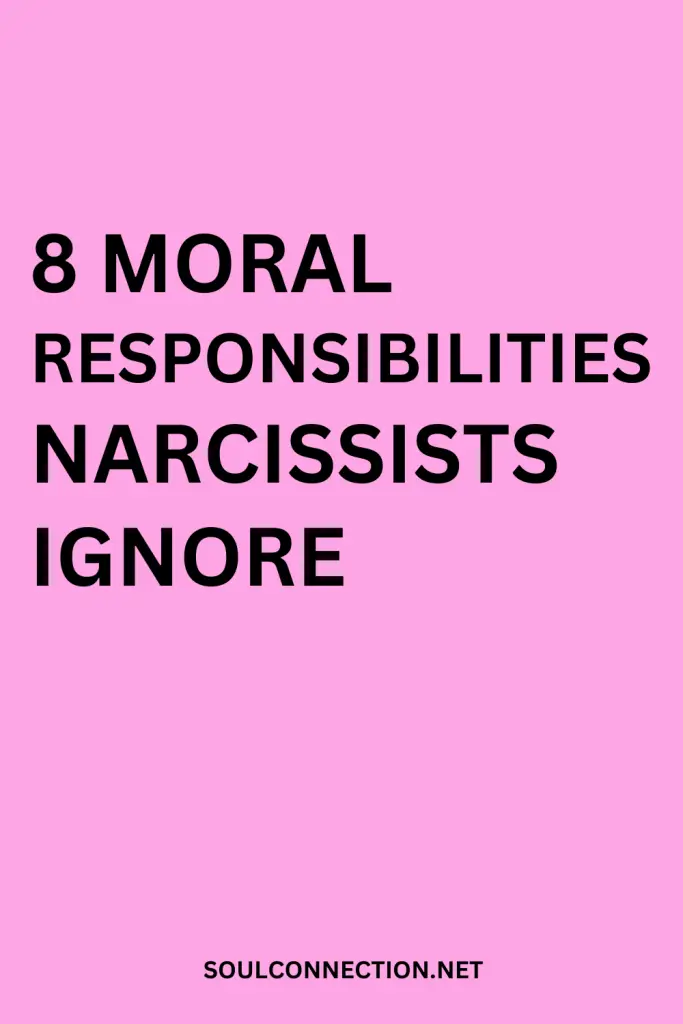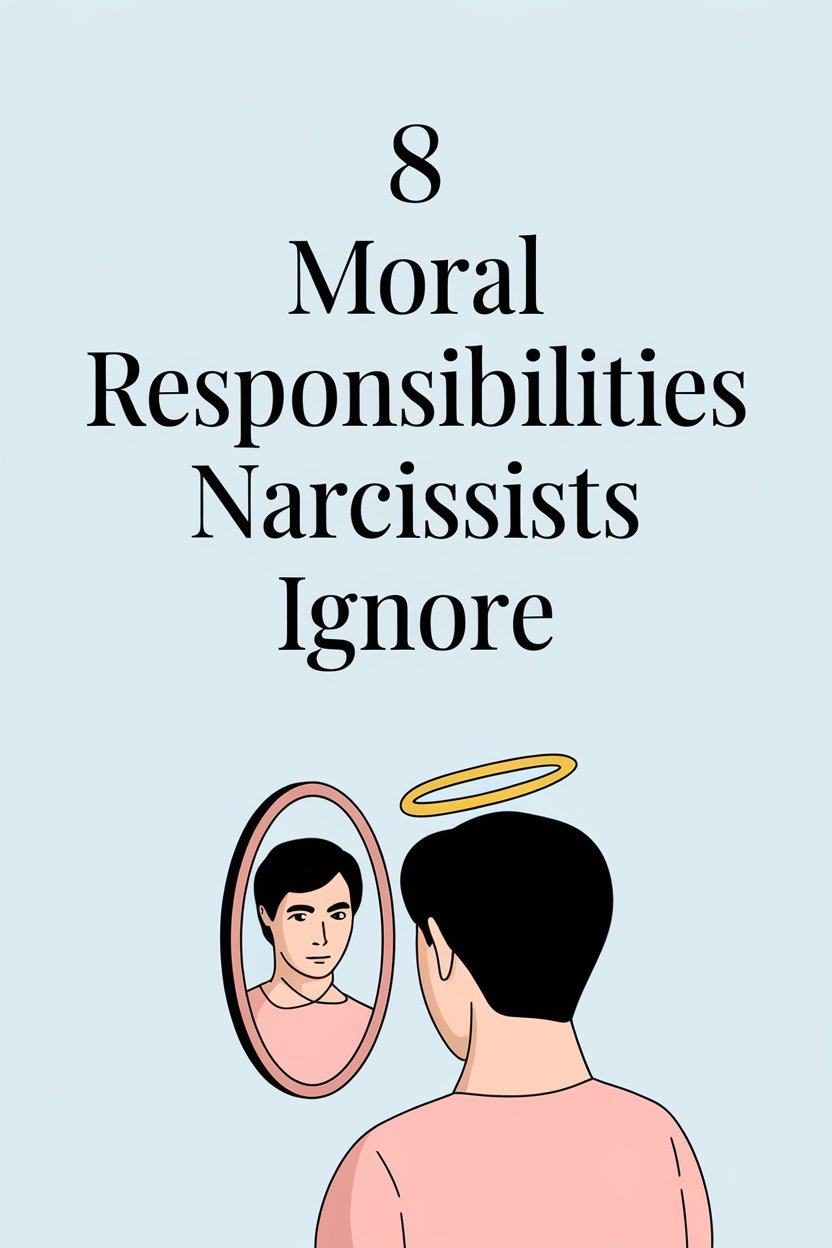Ever had a conversation where you walk away feeling like you’ve been run over by a steamroller powered entirely by someone else’s ego?
If so, you might have had a brush with narcissism—nature’s way of reminding us that not everyone got the “play nice with others” memo.
While none of us is perfect, most try to meet the basic responsibilities that come with being a decent human. Narcissists, on the other hand, tend to treat these moral duties like last year’s fashion: utterly irrelevant.
Here’s a look at eight moral responsibilities that tend to go MIA when narcissism’s in the driver’s seat.
1. Owning Up to Mistakes
Accountability has all the appeal of a cold shower to the garden-variety narcissist.
When things go pear-shaped, most folks will sigh, admit fault, and maybe even (gasp!) apologize. A narcissist, though? They’ll perform acrobatics worthy of Cirque du Soleil to pin the blame on someone else—anyone else.
Traffic jam? Must be your fault for picking that route. Overcooked dinner? Clearly you distracted them with your mere existence.
This refusal to own up doesn’t just shield their fragile sense of self; it also means the people around them are never sure where the next guilt trip will come from. And let’s just say, frequent flyer miles aren’t included.
What to do: If you’re dealing with a chronic blame-shifter, don’t fall into the trap of defending yourself endlessly. Calmly restate the facts and move on. Their lack of accountability doesn’t have to become your emotional baggage.
2. Respecting Boundaries
Boundaries are a bit like invisible fences: meant to keep everyone emotionally safe and sound.
Narcissists, though, tend to treat boundaries with about as much respect as a toddler treats a sandcastle—fun to smash, and not their problem if it collapses.
Whether it’s barging into private conversations, dismissing your need for alone time, or turning your “no” into a personal challenge, the narcissist’s default setting is “what’s yours is mine and what’s mine is also mine.”
What to do: Reinforce your boundaries clearly and consistently. If they keep poking at your limits, it’s not because you’re being “too sensitive.” It’s because some folks think the world is their personal playground—and you’re not the slide.
3. Genuinely Listening to Others
Active listening is the foundation of any healthy relationship. But for a narcissist, listening is often just an intermission between monologues.
Ever share something important, only to get a one-up story in response? Or watch your heartfelt confession get steamrolled by their urgent need to talk about themselves?
It’s not that they can’t hear you—they just don’t see why your feelings should take up valuable airtime.
What to do: Resist the urge to over-explain or beg for attention. Share with people who actually want to listen, and recognize when you’re being emotionally short-changed.
4. Practicing Empathy
Empathy: that charming trait where you care about how others feel. Narcissists are often missing this download.
While most people will pick up on your mood and try to comfort or congratulate you, the narcissist may seem baffled by your happiness or unmoved by your pain—unless, of course, it somehow impacts them directly.
For example: Lost your job? “Well, that’s inconvenient—who’s going to pay for dinner?” Got promoted? “Why wasn’t it me?” Their ability to center themselves in every scenario is kind of impressive—if it weren’t so exhausting.
What to do: Protect your energy. Expecting empathy from a narcissist is like expecting a cat to fetch your slippers. Save your vulnerable moments for those who can actually show up for you.
5. Being Honest, Even When It’s Inconvenient
Most of us have fibbed to save face or spare someone’s feelings (hello, “I love your new haircut”). But there’s a big difference between the occasional white lie and a chronic relationship with the truth that’s mostly long-distance.
A narcissist will twist facts, tell half-truths, or even flat-out lie if it means keeping their image squeaky clean. Their honesty tends to be situational—and the situation usually involves making themselves look good or dodging accountability.
What to do: Don’t waste time trying to catch every inconsistency. Instead, trust actions over words, and keep your wits about you when reality and their version of events don’t quite line up.
6. Supporting Others Without Expecting Payback
Doing something nice just because…it’s the right thing to do? Not exactly the narcissist’s style.
Acts of kindness often come with strings attached, even if those strings are invisible at first. If they help you move house, expect your gratitude to be mentioned at every family dinner until 2050.
If they send flowers, there’s a good chance they’ll want an audience for the performance.
Generosity, for the narcissist, tends to be transactional. The goal isn’t to support you—it’s to create a debt you’ll feel compelled to repay.
What to do: Notice when kindness is being used as currency. Accept help if you want, but don’t let anyone guilt you into a lifetime of payback for a single good deed.
7. Apologizing Sincerely
A genuine apology takes a bit of humility and a dash of self-awareness—two ingredients not commonly found in the narcissist’s pantry.
If you ever get an “I’m sorry,” check for the fine print. More often than not, it’ll sound something like: “I’m sorry you feel that way” or “I’m sorry, but you made me do it.” Actual remorse? Missing in action.
The non-apology apology is their specialty, and it tends to leave the recipient feeling more frustrated than before.
What to do: Don’t hold your breath waiting for an apology to fix things. Look for patterns: Do their words match their actions? Your peace of mind is worth more than a hollow “sorry.”
8. Acting Fairly in Conflict
Conflicts are part and parcel of any relationship. But fair fighting? That’s not really in the narcissist’s playbook.
Instead, they’re likely to move the goalposts, change the subject, or bring up ancient history that has nothing to do with the current issue. Gaslighting—making you question your own version of reality—can also make an appearance.
It’s not about resolving the conflict; it’s about winning at any cost. Debate club rules do not apply.
What to do: Refuse to get sucked into circular arguments or dragged off-topic. Keep to the facts, set your limits, and step back when the discussion turns into mental gymnastics.
When You’re Left Holding the Moral Compass
If you’re reading this, chances are you’ve felt the frustration of holding up the relationship end all by yourself.
Dealing with someone who treats moral responsibilities like optional accessories is more than just tiring—it can chip away at your self-worth and leave you questioning your own sense of reality.
Here’s the good news: their lack of conscience doesn’t get to define yours. You can protect what matters to you, reinforce your boundaries, and surround yourself with people who actually understand “give and take.”
And if you ever need a reminder that you’re not as crazy as you sometimes feel? Just reread the list.
Then pat yourself on the back for having a moral compass that actually works—even if theirs is permanently set to “me, myself, and I.”


